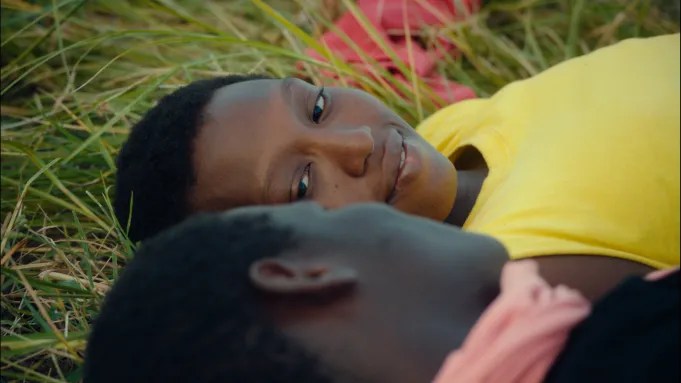‘Banel & Adama,’ ‘Hello Dankness’ Top Melbourne Film Festival Winners
On the final weekend of a bustling 18-day event, the in-person edition of this year’s Melbourne Film Festival has drawn to a close with an awards ceremony that saw a whopping $300,000 AUD (over $191,000 USD) in prize money handed out across six categories. The biggest individual award of $140,000 AUD (nearly $90,000 USD) was presented to the winner of the fest’s international Bright Horizons competition: “Banel & Adama,” an arresting debut feature by Franco-Senegalese filmmaker Ramata-Toulaye Sy.
It’s a notable coup for a small-scale rural love story that turned heads — but won no prizes — when it premiered in Competition at the Cannes Film Festival in May, and is still seeking distribution in the U.S. and other major territories. Reviewing the film out of Cannes, Variety critic Jessica Kiang commended the “subtly seductive power” of a “striking debut [that] revolves with graceful poetry around the inner experiences of a curious, unknowable woman.”
Its win came against formidable competition in the Bright Horizons selection, including such buzzy titles as Molly Manning Walker’s Cannes Un Certain Regard winner “How to Have Sex” and Phạm Thiên Ân’s haunting debut “Inside the Yellow Cocoon Shell” — which, back on the Croisette, beat “Banel & Adama” to the Camera d’Or prize.
Jointly chairing the jury were musician and filmmaker Saul Williams and his co-director Anisia Uzeyman, who won last year’s inaugural Bright Horizons award with their inventive Afro-futurist vision “Neptune Frost”; their fellow jurors included filmmakers Alexandre O. Philippe (“78/52,” “Lynch/Oz”), Anthony Chen (“Ilo Ilo,” “The Breaking Ice”) and Kamila Andini (“The Seen and Unseen,” “Yuni”). In a collective statement, they described Sy’s debut as “a film that speaks directly to the times with a cinematic language and landscape that challenges and confronts while drawing you into its immense beauty” and “a mysterious and strong first film from a young filmmaker with bright horizons.”
They further offered a special mention to another female filmmaker, Mexican writer-director Lila Avilés, whose freewheeling family drama “Tótem” was a critics’ favourite at the Berlinale in February (before being rather surprisingly shut out by Kristen Stewart’s jury). “The rich subtleties and nuance of this circular story draws us in and makes us a part of its family,” the Melbourne jury stated.
Williams and Uzeyman’s jury also determined the Blackmagic Design Australian Innovation Award — a $70,000 AUD (nearly $45,000 USD) prize restricted to homegrown talent — to avant-garde sibling filmmakers Dominique and Dan Angeloro, professionally known as Soda Jerk.
Already celebrated on the experimental scene for such sample-based works as “Terror Nullius” and “After the Rainbow,” they’ve been traveling the festival circuit over the past year with their latest “Hello Dankness,” a swirling visual essay that reflects on Trumpism, COVID and other recent sociopolitical matters via multimedia fragments that range from “Wayne’s World” to Reddit. The jury called it “a clear-eyed, sharply satirical take on one of America’s most troubling chapters, transformative use of existing footage, and groundbreaking manipulation thereof.” “Hello Dankness” will receive a limited Stateside release on September 8.
The First Nations Film Creative Award, for outstanding filmmaking and storytelling talent from Australia’s First Nations population, was presented to Adrian Russell Wills and Gillian Moody’s documentary “Kindred,” an autobiographical reflection on Aboriginal children removed from their birth families.
Another local documentary, meanwhile, took both the festival’s much-contested Audience Award and its Youth Jury Award: Thomas Charles Hyland’s auspiciously titled “This Is Going to Be Big,” a tender portrait of a high school for neurodivergent teens as they stage an ambitious musical, proved a word-of-mouth crowdpleaser as the festival unfolded. Thematically, it segued rather aptly into the night’s Closing Gala, Molly Gordon and Nick Lieberman’s Sundance-premiered comedy “Theater Camp.”
As a collective of winners, ranging from daringly subversive esoterica to audience-friendly heartwarmers, it reflects the spread of a vast, diverse festival program (numbering 267 films this year) that also saw fresh innovations in its retrospective sections. Months after her death in February, a career tribute to groundbreaking Senegalese docmaker Safi Faye — the first woman from sub-Saharan Africa ever to direct a commercially distributed feature — introduced legions of cinephiles to her under-seen work.
A new section, Critical Condition, invited international critics mentoring on the festival’s adjacent Critics’ Campus program for new writers to present a favorite classic or undervalued film and moderate a post-screening discussion to contextualize it for contemporary audiences. For this critic, getting to present Rainer Werner Fassbinder’s feverishly homoerotic swansong “Querelle” to a sold-out house — despite roaring competition from crowds assembled for Australia’s quarter-final triumph in the soccer World Cup that same night — was the enduring joy of a festival rich in revelations.
Full list of Melbourne Film Festival winners:
Bright Horizons Award (presented by VicScreen): “Banel & Adama,” directed by Ramata-Toulaye Sy
Bright Horizons Special Jury Mention: “Tótem,” directed by Lila Avilés
Blackmagic Design Australian Innovation Award: Soda Jerk, directors of “Hello Dankness”
First Nations Film Creative Award in collaboration with Kearney Group: Adrian Russell Wills and Gillian Moody, directors of “Kindred”
MIFF Audience Award: “This Is Going to Be Big,” directed by Thomas Charles Hyland
MIFF Schools Youth Jury Award: “This Is Going to Be Big,” directed by Thomas Charles Hyland

